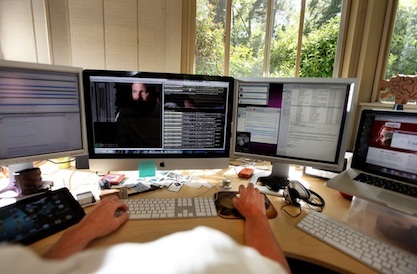
There are many potential threats online such as viruses, malware and hackers. However, one threat that internet users should consider above all others is the effect multiple distractions can have on your work, personal life, ability to focus and mental health in general.
Focus is essential in carrying out any task properly and to the best of your ability. Of course, there’s a simple antidote to getting distracted from the task at hand while online – self discipline. But self-discipline is easier said than done when you’ve got work, friends, news, blogs, instant messenger contacts and mobile phones all vying for your attention online. There can be little doubt that the simple art of focusing on one task at a time or even one thing at a time is harder in the 21st Century than ever before. Not only are there more technological distractions but we’re actively expected by employers to be “mutli-taskers” in the workplace.
According to some scientists, we’ve even become “chemically addicted” to this constant mental rush of activity. Blogger Edward Winkelman highlights an article in The New York Times which describes the magnitude and consequences of this change:
In 2008, people consumed three times as much information each day as they did in 1960. And they are constantly shifting their attention. Computer users at work change windows or check e-mail or other programs nearly 37 times an hour, new research shows.
The nonstop interactivity is one of the most significant shifts ever in the human environment, said Adam Gazzaley, a neuroscientist at the University of California, San Francisco.“We are exposing our brains to an environment and asking them to do things we weren’t necessarily evolved to do,” he said. “We know already there are consequences.”
Scientists say juggling e-mail, phone calls and other incoming information can change how people think and behave. They say our ability to focus is being undermined by bursts of information.These play to a primitive impulse to respond to immediate opportunities and threats. The stimulation provokes excitement — a dopamine squirt — that researchers say can be addictive. In its absence, people feel bored.
The resulting distractions can have deadly consequences, as when cellphone-wielding drivers and train engineers cause wrecks. And for millions of people these urges can inflict nicks and cuts on creativity and deep thought, interrupting work and family life. While many people say multitasking makes them more productive, research shows otherwise. Heavy multitaskers actually have more trouble focusing and shutting out irrelevant information, scientists say, and they experience more stress.
It is this high level of stress that is a bigger threat than any virus, trojan or hacker out there. Since we’ve become so accustomed and deeply connected to our online life of distractions, the stress it causes can be very difficult thing to even perceive – we just get used to it as part of modern life. It’s often only when people take time out such as on holiday when they get away from it all that they can see the symptoms of it such as irritability, mental exhaustion and a lack of focus.
Most worrying of all is that the “addiction” to information is turning into us Johnny Five from Short Circuit with a voracious thirst for new “input” that broadens our minds while possibly reducing our overall ability to reflect, contemplate and critically think for ourselves.
Of course I’m not suggesting we all go back to the stone age and toss our computers and mobile devices in the trash. You can simply re-evaluate certain aspects of your online life and decide whether they’re really essential like Tom did when he quit Facebook. I’m also a big believer in self-discipline although I think the temptations and distractions are so great nowadays, that there’s nothing wrong with a helping hand. If you need one, then I recommend (for writers at least) trying a few applications that block online distractions and help you focus such as WriteRoom for Mac and Dark Room for Windows.
Alternatively, you could just disconnect from the net and switch off your mobile for a while – although personally I’ve never quite managed this yet.
[Image via the The New York Times]

